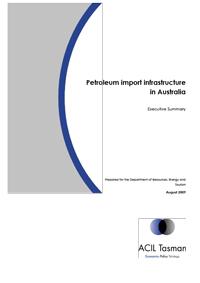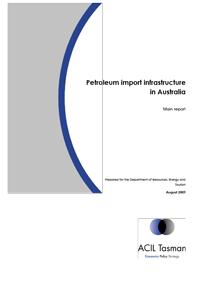Resources
Date
Description
Subsidising domestic alternative fuel production is not necessary for energy security The reliable supply of conventional transport fuels (petrol, diesel and jet fuel) to the Australian market is underpinned by a diversity of supply options for petroleum products from domestic refiners and…Date
Description
Australia’s import, terminal and storage capacity for transport fuel has increased over time to meet growth in fuel demand There has been significant investment in new and expanded storage and terminal facilities over recent years to meet demand growth in key regional centres, as evidenced in…Date
Description
Relying on shipping (for imports) does not increase security risks, and shipping lanes are not easily disrupted. Most countries are reliant on movements of petroleum (crude and product) within and between countries, and particularly so for Australia (in both an export and import sense).…Date
Description
Transport fuel imports do not increase risk for supply reliability and security A diversity of global supply sources and local import facilities provide a range of options for Australia. Australia is already dependent on imports to meet the growth in demand for transport fuels (eg. demand…Date
Description
Australian refineries continue to operate with no indications of any plans to close the remaining four There have been statements and Inquiry submissions from all refining companies about their future refinery investment plans and the ongoing role of these facilities in meeting customer…Date
Description
Self-sufficiency in transport fuels is not necessary for supply security Security of supply is the result of resilient and efficient supply chains and robust risk management – it is not about self-sufficiency or independence from markets. There are 3 critical elements of any strategy to… ,
, 
Date
Description
ACIL Tasman, on behalf of the Federal Department of Resources, Energy & Tourism, has completed a comprehensive Audit of terminals suitable for importing petroleum products into Australia. The findings of the Audit are outlined in ACIL's Tasman's report - 'Petroleum Import Infrastructure in…Date
Description
The oil industry today supported the announcement by the Federal Minister for the Environment Robert Hill that leaded petrol would be phased out nationally by 1 January 2002. 'The oil companies will be introducing lead replacement petrol progressively in each State, in consultation with State…Date
Description
The Australian Institute of Petroleum has welcomed the Federal Government's decision to crack down on illicit fuel blending activities, but has urged wider reform to stop the problem re-occurring in the future. "Today's announcement by the Assistant Treasurer, Senator Rod Kemp, that the…Date
Description
The Australian Institute of Petroleum today called on the Australian Automobile Association to support measures to combat the current fuel substitution racket. AIP Executive Director, Mr Jim Starkey, said the Australian Automobile Association's opposition to excise uniformity on petroleum…